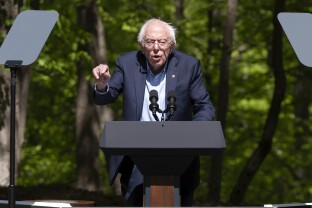The Congressional Progressive Caucus released its legislative priorities last week, but noticeably absent from its described plan to “rebuild the American dream for the poor, working, and middle class” should Democrats win in 2024 was a longtime centerpiece of the progressive agenda: “Medicare for All.”
But progressive lawmakers and grassroots leaders who have championed Medicare for All saw its exclusion as a largely pragmatic move by CPC’s chair, Rep. Pramila Jayapal. Even Sen. Bernie Sanders, who popularized the single-payer health care proposal during his 2016 presidential run, said he was surprised but understood the omission.
“I don’t know what the [CPC’s] motives are. I think maybe they were thinking of a more short-term agenda rather than long-term, but I don’t know,” Sanders told NOTUS. “We’re clearly in a broken and dysfunctional health care system, which is the most expensive and wasteful in the world. Clearly, clearly, we need to move for Medicare for All.”
Sanders reintroduced the Medicare for All Act in the Senate in 2023. His bill would create a national health insurance program that would automatically enroll all United States residents from birth and cover almost all out-of-pocket medical costs. Jayapal also reintroduced the companion bill in the House last year.
Jayapal told NBC News, prior to the CPC unveiling its agenda, that focusing on issues like raising the minimum wage was to bring Democrats and progressive voters together around issues that are “populist and possible.” Also excluded from the agenda this year was any mention of Israel and Gaza, as the conflict has caused major rifts in the Democratic Party.
The CPC’s agenda won’t entirely abandon the expansion of health care benefits as a policy priority. The agenda seeks to expand Medicare to include dental, vision and hearing and lower the eligibility age for Medicare while preventing the privatization of Medicare by private insurance companies, Jayapal said in a statement.
“I believe it is the change we need to see in our health care system to ensure every person can receive the care they need,” she said. “Our movement is strong, and we won’t stop until we transform our system to a single-payer system where everyone is in and nobody is out.”
Sen. Mazie Hirono, who co-sponsored Sanders’ Medicare bill in the Senate, told NOTUS that she understands “[Jayapal’s] rationale” because Medicare for All is a “very progressive piece of legislation.”
“Let’s keep ourselves united,” she said. “There are going to be efforts to get rid of the Affordable Care Act again if former President Trump gets his way. That’s one of the many crazy positions he is taking on.”
Sign up for the latest from NOTUS.
Sen. Richard Blumenthal, another co-signer of Sanders’ bill, concurred and described Jayapal as a “credible and well-respected legislator” with a “better feel of the House than I do.”
Twenty-eight progressive organizations endorsed the agenda — including Our Revolution, a group spun out of Sanders’ 2016 presidential campaign.
Joseph Geevarghese, the organization’s executive director, told NOTUS that the CPC was strategic in realizing that Medicare for All would not move under the Biden administration or with the broader Democratic caucus.
“There’s just a realistic acknowledgment that [Medicare for All] is not going to happen next year or the year after,” he said. But, the agenda “sends Biden a message.”
“[The CPC has] influenced the content of Biden’s signature accomplishments like the American Rescue Plan and the Inflation Reduction Act. They fought like hell for Build Back Better even when moderate Democrats backed away. It was a CPC, you know, pushing the president’s platform,” said Geevarghese, “And so I think what they’ve articulated is, ‘Here are the pragmatic next steps to move forward that a majority of the caucus [are] behind.’”
—
Tinashe Chingarande is a NOTUS reporter and an Allbritton Journalism Institute fellow. Oriana González, a reporter at NOTUS, contributed to this report.
Sign in
Log into your free account with your email. Don’t have one?
Check your email for a one-time code.
We sent a 4-digit code to . Enter the pin to confirm your account.
New code will be available in 1:00
Let’s try this again.
We encountered an error with the passcode sent to . Please reenter your email.


